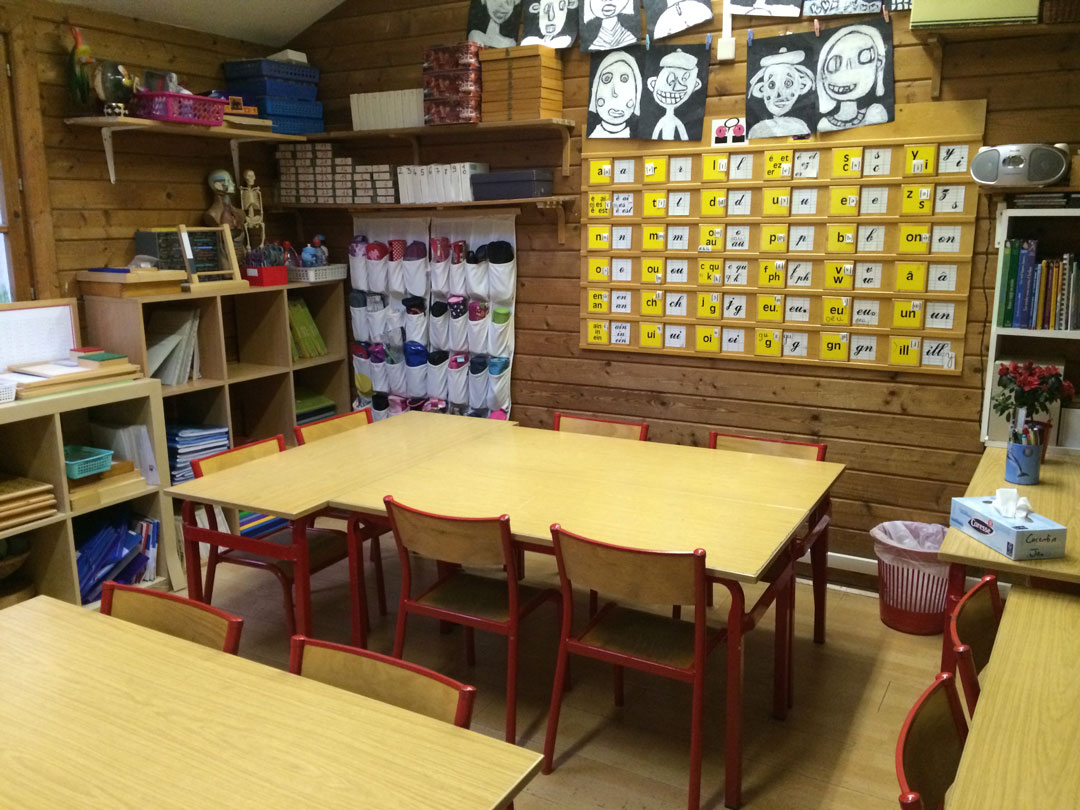
The approach: Priority given to reflection, autonomy, and the right to make mistakes.
No written homework, thanks to focused and fruitful work periods in class.
CP from age 5 for two years
Small class sizes (15-18 maximum)
English language classes each day by Anglophone teachers.
THE PRIMARY SECTION
• The approach: Priority given to reflection, autonomy, and the right to make mistakes.
• No written homework, thanks to focused and fruitful work periods in class.
• CP from age 5 for two years
• Small class sizes (15-18 maximum)
• English language classes each day by Anglophone teachers.
CP2, CP: Fundamental Skills and Learning
These preparatory classes (“cours préparatoire”) take place over two years (C.P.2 and C.P.). Here, students gain the basic skills and solid foundation that will serve them throughout their school years. The idea is not to take short-cuts through these crucial years, but to give each child sufficient time to master the complex, but fundamental, skills involved in reading, writing, and basic math.
Reading and Writing
Students are taught very early to understand that written signs are transcriptions of phonetic ones, and that all written words carry messages. Deciphering these signs and using them are the goals of reading and writing. Learning happens away from textbooks through collective and individual materials. Each child progresses at her own pace and level as she disc overs the pleasure of reading.
Mathematics
Thanks to manipulative materials, students can discover the decimal system and master basic mathematical operations. The goal here is not to train children how to complete an exercise, but rather to have them understand what a mathematical problem is asking of them and develop strategies to solve it appropriately through building on what they know to discover what they don’t know yet.
CE1, CE2: Active Students, Reflective Process
In CE1 and CE2, students learn how to learn. They acquire new skills alongside an ever-expanding knowledge set. They develop their capacities for reflection and reasoning which allows them to make careful decisions.
Constantly challenged, students are taught to reflect on what they know rather than simply recall facts:
• When reading, they learn to sift through information in order to build meaning
• When doing math, they are encouraged to consider instructions carefully before following them.
• When exploring history, they are invited to extend their knowledge of the world to include landmarks outside their daily life.
CM1, CM2: Autonomous Students, Ready for the Transition to Middle School
The CM classes are structured so as to maximize student autonomy. Besides “whole class” periods which are generally at the beginning of the day, students are free to move around the class, choose their work and organize themselves to complete it as efficiently as possible. During the afternoon, students work together in small groups on a variety of projects. Reading and writing are at the heart of CM learning activities.
Since students have acquired a taste for reading and developed the capacity to defend their choices, students exchange reading suggestions during “literary cafés” organized each trimester.
Similarly, as critical thinkers with precise vocabularies, as well as the ability to research, analyse and synthesize documents, students work together to create and publish a school newspaper. (link to Info School) Autonomy, reflection, and the desire to learn: Our CM students possess a well-honed toolkit to smooth their transition to middle school.
The Transition to Middle School
As in all independent private schools, students can integrate into public middle schools after passing a short entrance exam for which they are fully prepared. Equally, they can move on to private middle schools (secular or religious, French or international) – some of which have entrance exams, some of which do not.
Throughout their primary schooling, our school uses the appropriate methods (active learning, respect for curriculum) to offer families a wide selection of possible avenues for further study for their children.
For those parents who desire it, we offer an interview with the head of school and homeroom teacher during the first trimester of CM2, to help point you towards an institution that corresponds with your vision as well as the personality of your child.
